
by Victoria Silverwolf
Straight From the Horse's Mouth
The Noble Editor and my Esteemed Colleagues always do a fine job of informing our fellow Journeyers about what's happening on Earth and in outer space. There is one small piece of news, however, which seems to have escaped notice.
The last episode of Mister Ed appeared on American television screens last week. For those of you fortunate enough not to be familiar with this program, it's about a talking horse.

The star of the program. I believe there are some human actors as well.
I find it remarkable that a show with a premise that does not lend itself to a large number of variations has lasted for more than five years. For those of you who are counting, that's five times as long as the excellent, groundbreaking series East Side/West Side.

George C. Scott as New York City social worker Neil Brock. He doesn't seem happy about being outdone by a loquacious equine.
To add insult to injury, Mister Ed wasn't even original, but an obvious imitation of a series of low budget movies about Francis the Talking Mule, who appeared in no less than seven films from 1950 to 1956.

In Hollywood, changing a talking mule to a talking horse is known as creativity.
How Green Was My Valley
If the success of Mister Ed proves that entertainment was less than perfect in the recent past, a new novel suggests that the future of popular literature may lead to some tension among sensitive readers.

Every Night, Josephine! is a nonfiction book about the author's dog. I can't seem to get away from animals, can I?
Jacqueline Susann's first novel, Valley of the Dolls, appeared in bookstores a couple of days ago. The word on the street is that it is quite racy. I expect the author will earn a fair amount of greenbacks from this fledgling work of fiction.
A Songbird Flies Back
In the world of popular music, even a song a few weeks old can seem dated. A little more than a year ago, multilingual British singer Petula Clark had a Number One hit in the USA with her upbeat number Downtown, which I quite like. I might even say her past success is far from imperfect.
Now she's back with another smash hit. It makes me a little tense to realize that My Love isn't as good a song as Downtown, but I have to admit that the lady can sing, and I wish her more success in the future.

You're going to the top of the charts, dear.
Half a Century for Half a Buck
Given the fact that Fantastic and its sister publication Amazing are now filling their pages with lots of reprints, not all of them classics, we have plenty of evidence that speculative fiction's past hasn't always been perfect. The latest issue goes back in time nearly fifty years, but also features a couple of new works. Appropriately, many of the stories deal with threats from the distant past, while the only futuristic tale describes a tense situation that may confront the people of tomorrow.
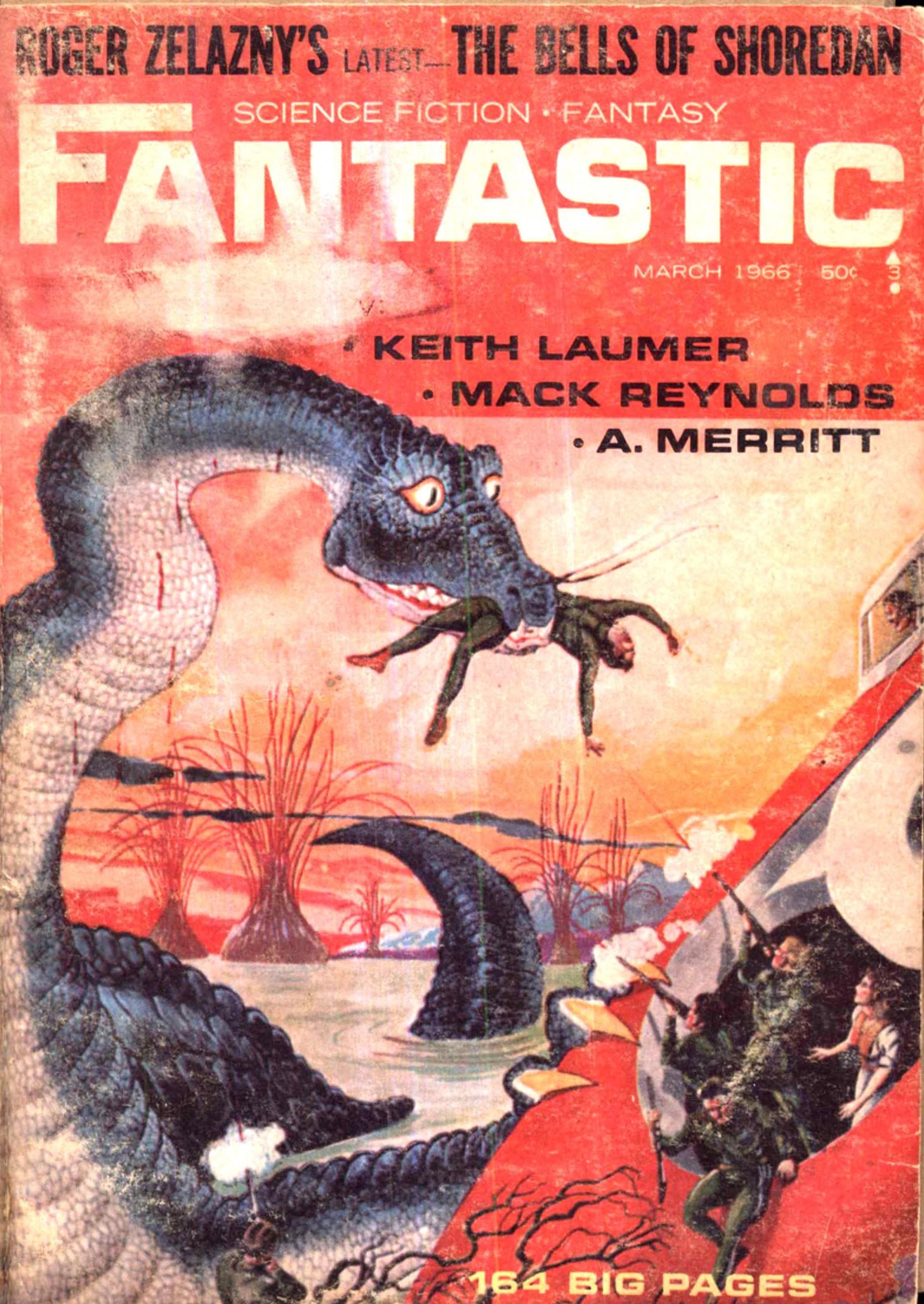
Cover art by Frank R. Paul, reprinted from the back cover of the November 1940 issue of Amazing Stories, as shown below.

I don't think this is a very accurate picture of what the surface of the moon Titan might be like.
The Bells of Shoredan, by Roger Zelazny

Illustrations by Gray Morrow.
We've already met Dilvish, a warrior who escaped from Hell, a couple of times before. He returns to the material world to defend his homeland, with the aid of a being that takes the form of a steel talking horse. (There's that again! Francis and Ed, what hath thou wrought?)
In this adventure, he journeys to the ruins of an incredibly ancient, seemingly deserted citadel. His quest is to ring enchanted bells that will summon soldiers from the limbo where they have been trapped for an immense amount of time. Along the way, he acquires a temporary companion in the form of a priest.

The unlikely pair witness a ghostly battle.
Dilvish is an intriguing character, and the author gives readers just enough information about his past to make them want to know more. This sword-and-sorcery yarn is full of imaginative supernatural happenings and plenty of action. I could quibble about the author's attempt to sound archaic — he has a habit of inserting the word did before verbs in order to sound old-fashioned — but that's a minor point. Overall, it's a solid example of the form. I'd place it somewhere between Robert E. Howard and Fritz Leiber, and a little bit higher than John Jakes.
Four stars.
Hardly Worth Mentioning, By Chad Oliver
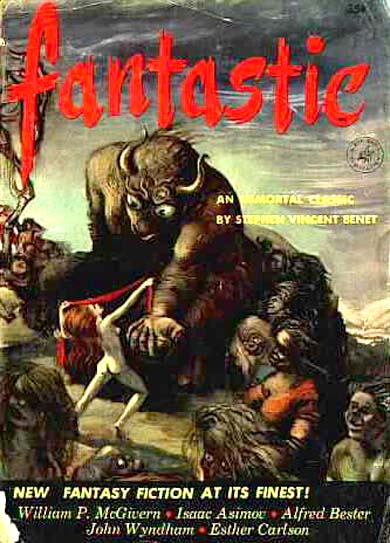
Cover art by W. T. Mars.
From the pages of the May/June 1953 issue of the magazine comes this tale of unexpected rivals of humanity from the mists of prehistory.
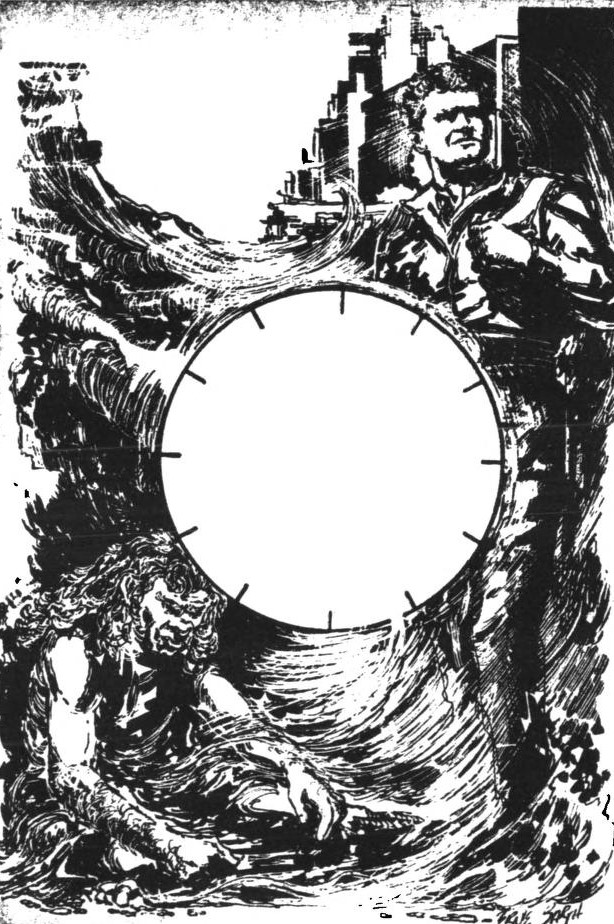
Illustrations by Ernie Barth.
A team of archeologists digging in rural Mexico discovers a plastic disk in a layer of soil from pre-Columbian times. The apparent paradox leads the protagonist to discover that another humanoid species, distinct from Homo sapiens, has been directing human history since the beginning. They even have the ability to travel in time, in order to correct little mistakes, like leaving the plastic disk where it could be found centuries later.

An army of the time travelers arrives in an ancient Indian village.
When the archeologist discovers the truth, the humanoids hurt him in the worst way possible. Knowing that he cannot fight them directly, he resolves to protect the future of humanity in a different way.
The author is an anthropologist by profession, so his portrait of the related field of archeology is completely convincing. The price the protagonist must pay for learning too much carries a powerful emotional impact. I was pleased and surprised to find out that the story avoids a melodramatic battle between the two species, but instead ends in a quiet, hopeful, bittersweet fashion.
Four stars.
Axe and Dragon (Part Three of Three), by Keith Laumer

Illustration by Gray Morrow.
In the first two parts of this novel, we journeyed with our hero, one Lafayette O'Leary, into another reality, that he seemed to create through self-hypnosis. After many wild adventures, he wound up getting blamed for the disappearance of a beautiful princess. Now he sets out to rescue her from a legendary ogre and his dragon.
This segment starts off with an even more comedic tone than the others, bordering on the just plain silly. Lafayette meets with some folks who are obviously intended to be cartoon versions of Arabs. They remind me of a famous novelty song from a few years ago, Ahab the Arab, by comic singer Ray Stevens. As an example of the goofiness, at a feast they not only consume Chinese and Hawaiian dishes, but bottles of Pepsi.
Anyway, Lafayette goes on to acquire a loyal steed in the form of a friendly dinosaur, and finally meets the ogre. The ogre has a very strange brother indeed. After an unexpected scene of bloody violence in such a lighthearted story, Lafayette returns to the palace. He meets an old rival, learns the truth about the king's mysterious wizard, saves the princess, discovers who was behind her kidnapping, finds out about his own special background, and gets the girl (although maybe not in the way you'd expect.)
The whole thing moves at a furious, breakneck pace, so that you don't realize it doesn't always make a whole lot of sense. Lafayette's ability to change reality, for example, seems to come and go, depending on how the author needs to propel the plot. There's a scientific explanation, of sorts, from the so-called wizard about what's really going on, but it might as well just be pure magic. It's entertaining enough to keep you reading, but hardly substantial.
Three stars.
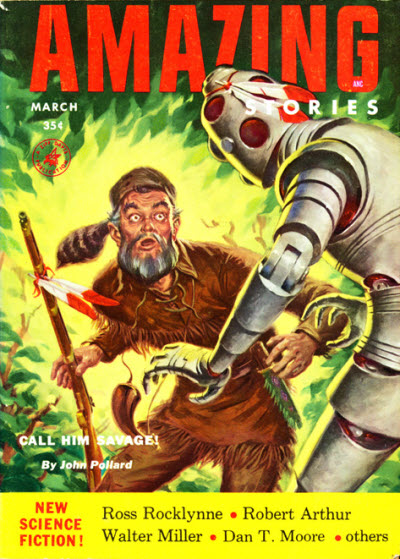
Cover art by Clarence Doore.
The March 1954 issue of Amazing Stories supplies this brief tale, from a master of the short-short story.
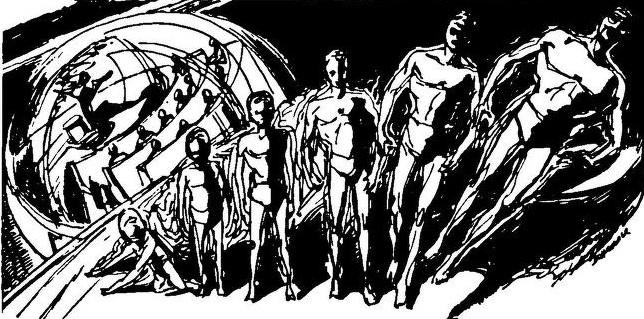
Illustration by John Schoenherr.
From birth, a group of people are bred to survive on the surface of Mars. The narrator is one of these folks, and reveals their plans.
Some of Brown's tiny tales are masterpieces of a very difficult form. This one is not. I saw the twist ending coming. Maybe you will, too.
Two stars.
The People of the Pit, by A. Merritt
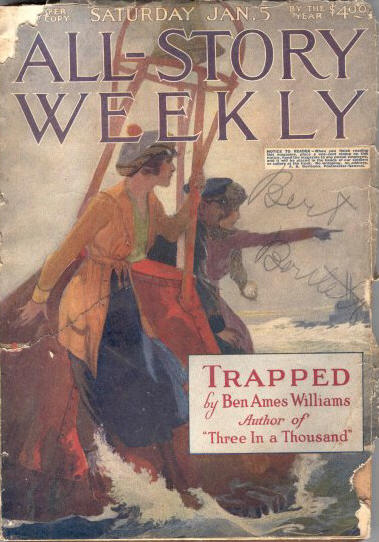
I have been unable to find out who drew this cover.
We jump back to the January 5, 1918 issue of All-Story Weekly for yet another yarn about danger from the remote past. It was reprinted in the March 1927 issue of Amazing Stories.
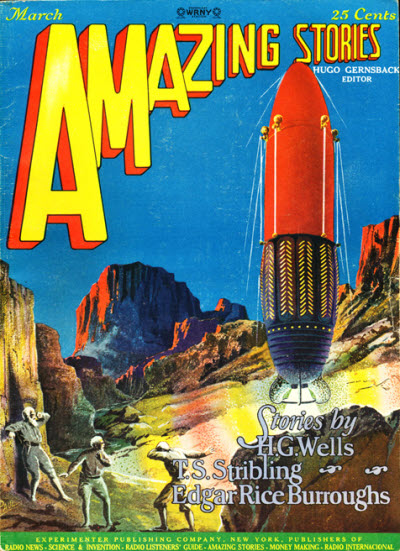
Cover art by Frank R. Paul.
Some folks head for a remote part of the Arctic in search of gold. A man who is nearly dead crawls to their campsite and relates his strange story.
It seems that there is an immense pit, bigger than the Grand Canyon, beyond a chain of mountains. Not only that, but a gigantic set of stairs, carved in the remote past, leads down into it.
The fellow descends into the pit, and encounters bizarre beings who enslave him. He tells how he finally escaped, and managed to crawl his way back up to the surface.
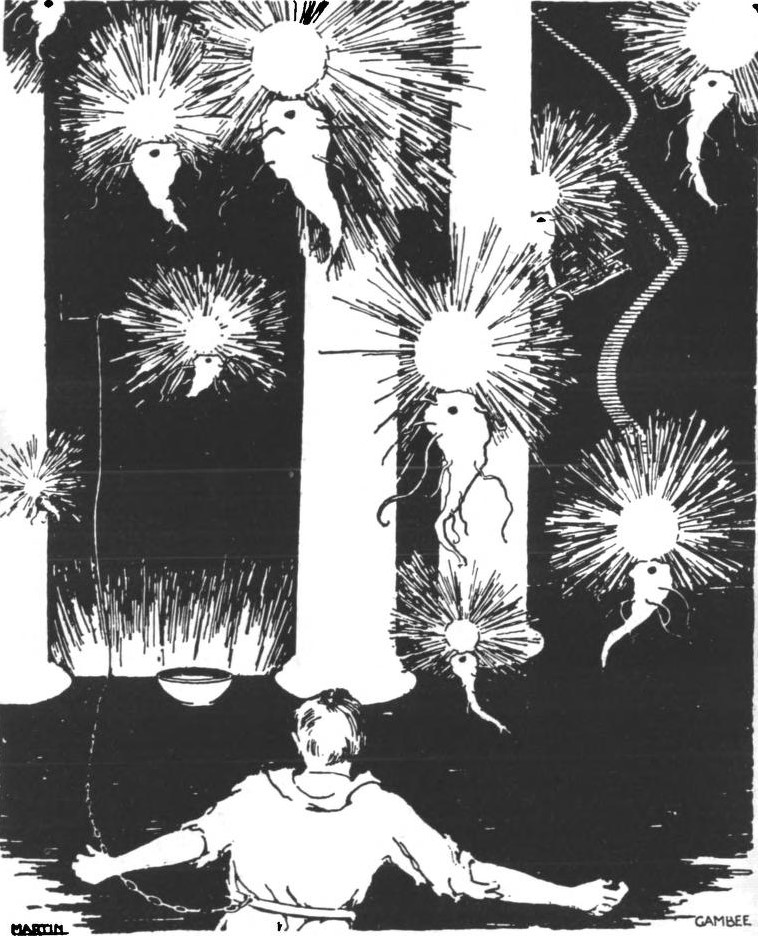
Illustration by Martin Gambee.
This story reminds me of H. P. Lovecraft, with its unimaginably old structures and creatures who are almost beyond the ability of the human mind to conceive. Given the original date of publication, I presume Lovecraft was influenced by it. The author creates a genuine sense of weirdness and menace. The old-fashioned use of a narrative-within-a-narrative slows things down a bit, and it's mostly description rather than plot, but it's not bad at all.
Three stars.
Your Soul Comes C.O.D., by Mack Reynolds
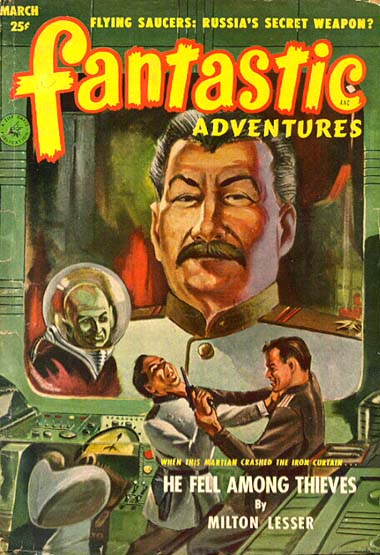
Cover art by Leo Summers and Ed Valigursky.
Once you get beyond the face of Joseph Stalin on the front of the March 1952 issue of Fantastic Adventures, you'll find the original appearance of this variation on a very old theme.
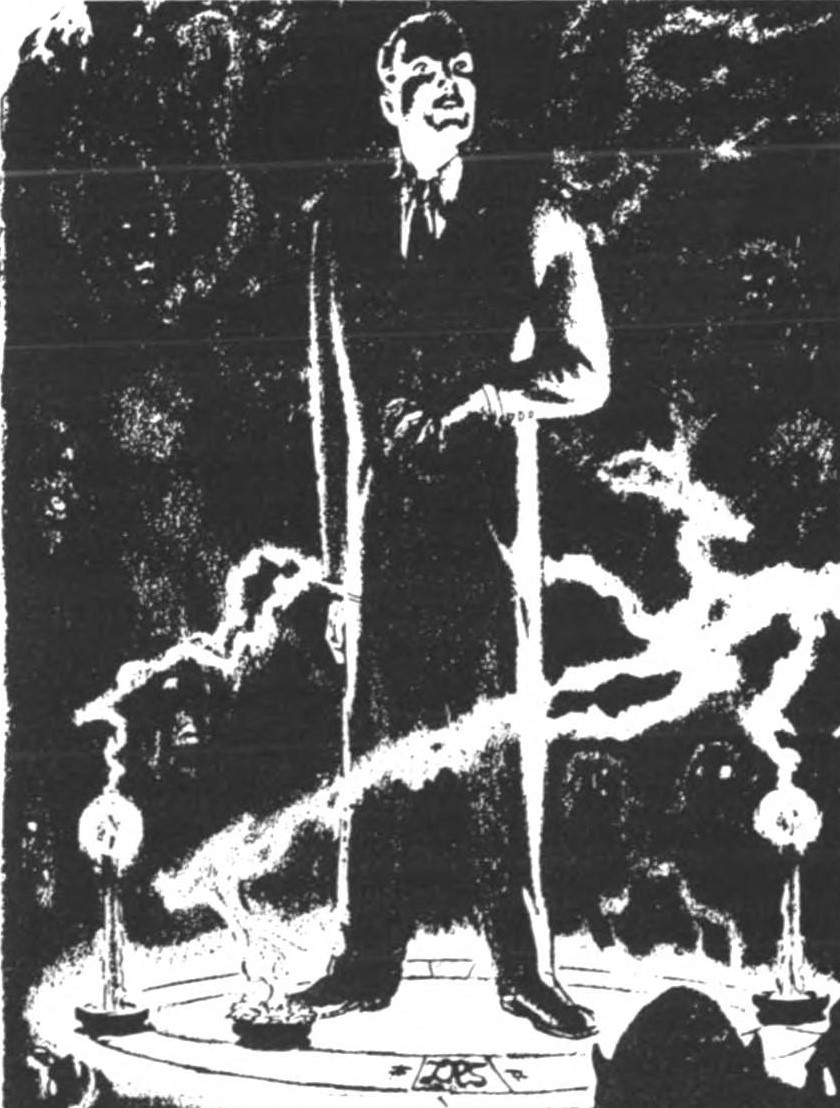
Illustration by Leo Summers.
A guy intends to summon a demon in order to exchange his soul for a good life. Before he can even perform the necessary ritual, however, a being appears, ready to make a deal. The man gains forty years of true love, prosperity, and a happy family. When it comes time to pay the price, he finds out what he bargained for.
A story like this depends entirely on the twist in the tail. I have to admit that the author took me by surprise and came up with a new version of the sell-your-soul premise.
Three stars.
How Did You Enjoy Today's Grammar Lesson?
Example of the past imperfect: I was reading Fantastic magazine yesterday.
Example of the future tense: I will finish this article today.
Well, that may not be the best way to study the structure of English, but it gives me something to think about while I sum up my feelings about this issue. For the most part, it was pretty good. Only the Fredric Brown reprint was disappointing, because I expected more from him. There was a good old story, and a good new story. The rest of the stuff was decent filler.
If you don't care for the way I'm acting like a language instructor, maybe you'd prefer something a little more technologically advanced.
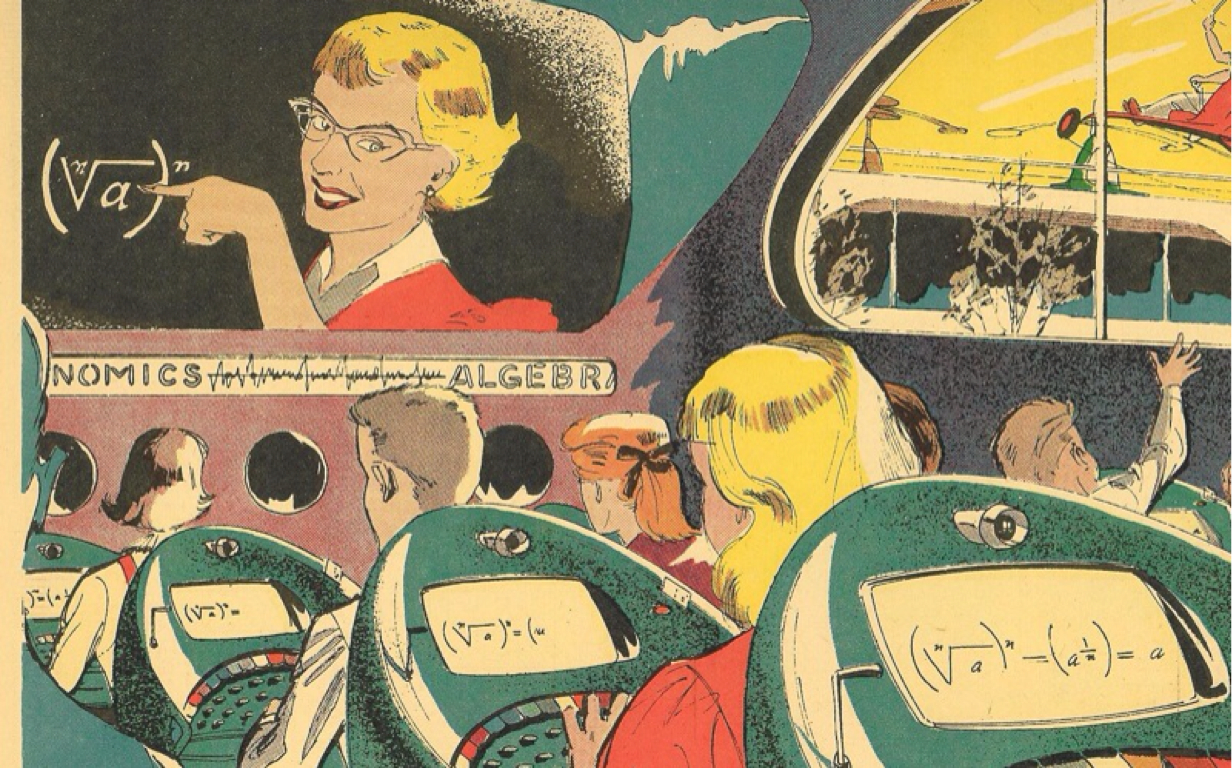
Don't blame me if you don't like math.
The Journey is once again up for a Best Fanzine Hugo nomination — and its founder is up for several other awards as well! If you've got a Worldcon membership, or if you just want to see what Gideon's done that's Hugo-worthy, please read his Hugo Eligibility article! Thank you for your continued support.

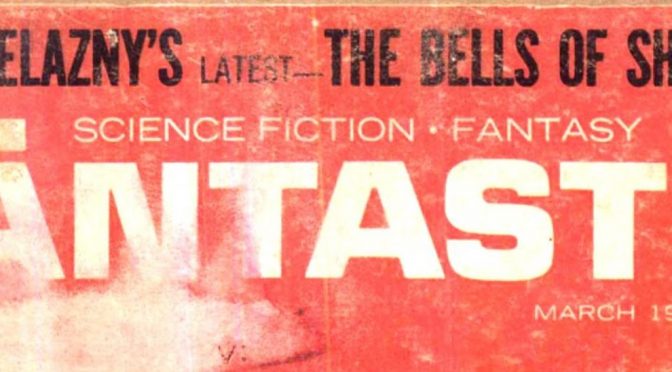

This really was a very good issue. What a pity it couldn't all have been new stuff.
Roger Zelazny really is an amazing author (no pun intended). His skill in these Dilvish stories at suggesting just enough about the world and his protagonist to keep us engaged is wonderful. Nearly the equal of Lord Dunsany in that regard. I do wonder, though, if he might have been inspired by "The Lord of the Rings". There's a scene in the third book which this reminds me of. Or maybe Zelazny and Professor Tolkien are drawing from the same tradition.
Chad Oliver has always been very good, though we haven't seen much of him in recent years apart from a couple of new stories last year. I suppose science fiction stories don't count towards the publish or perish mindset of academe. Anyway, this was a terrific story.
The Laumer was all right. I certainly liked this better than his other madcap comedy, "The Great Time Machine Hoax". This also isn't the first time he's used that particular resolution of "getting the girl". I rather expected it. On a side note, this is the second time in as many issues that Ross (assuming he writes the blurbs) has referred to the protagonist as Laurence rather than Lafayette. Makes me wonder how much attention he's paying to the stuff he publishes.
The Brown was disappointing. And I don't think that comes from high expectations for the name on the tin. It just wasn't a good story.
Abraham Merritt was second only to Rider Haggard when it comes to lost civilization stories and easily surpassed him when it came to adding weird or esoteric elements. Merritt did inspire Lovecraft, though HPL's favorite story was "The Moon Pool". They met once and apparently had a fair bit of mutual admiration. Anyway, good story, though not his best.
I think I liked the Reynolds slightly less well than you did. Nothing wrong with it and the twist is very good, just didn't quite engage me as much. Unlike with the Fred Brown story, I think the author's name did have something to do with my feelings about it. I have certain expectations when I see Mack Reynolds' name and this went in a very different direction. Still good.
I have been enjoying Roger Zelazny's occasional forays into the sword and sorcery genre a lot and "The Bells of Shoredan" is another good one. Zelazny is a bit hit and miss for me, e.g. I disliked the much lauded "Rose for Ecclesiastes", but when he's good, he's very good.
The Chad Oliver was a nice surprise, since I wasn't familiar with this author's work before.
Keith Laumer's novel is silly, but a lot of fun.
A. Merritt is a classic fantasy author from the early years of the 20th century who influenced a lot of writers of the Weird Tales school and beyond. His fame seems to be fading more than 20 years after his death, so I'm happy to see a reprint, especially since I wasn't familiar with this particular story.
Fredric Brown has always been hit and miss for me. This one is clearly miss.
The Mack Reynolds story feels like something that might have appeared in Unknown twenty-five years ago. It's all right, but still feels very familiar, in spite of the twist.